No surprises in cabinet election
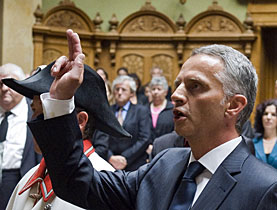
Didier Burkhalter has been elected to a seat in the Swiss cabinet. The 49-year-old member of the centre-right Radical Party will replace Pascal Couchepin.
Burkhalter was elected in the fourth round of voting in parliament, gaining the support of 129 out of 245 members.
Burkhalter comes from the French-speaking canton of Neuchâtel, which he has represented in the Senate since 2007. He sat in the House of Representatives from 2003 to 2007, and was a member of the Neuchâtel city council from 1991 to 2005.
He will take up his new duties on November 1. He is expected to take over the interior ministry.
The candidate of the centre-right Christian Democrats, Urs Schwaller, had led until the third round. But at that point Christian Lüscher, the second official Radical candidate stepped down in favour of Burkhalter, who had gained more support in rounds two and three.
The rightwing People’s Party, which had supported Lüscher, announced at that point that it would transfer its votes to Burkhalter.
Farewell speech
The election became necessary when Couchepin, the interior minister and also from the Radical party, announced his resignation after more than 11 years in cabinet.
Before the election started, Couchepin gave a farewell speech to parliament, wrapping up the 40 years he had spent in politics.
He spoke in favour of compromise and trust, and urged voters to support his plans for propping up the state-run disability insurance scheme when it comes to a popular vote later this month.
His speech was greeted by a standing ovation.
“An opportunity for the future”
In his acceptance speech, Burkhalter described his election as “an opportunity and an invitation for the future”.
He welcomed the fact that parliament had respected the traditional allocation of seats in the cabinet, where the Radicals have two members.
His election reflected “a search for balance, which is the wealth and strength of Switzerland” he said.
He delivered his speech in French, but promised that in future he would also speak German, Italian and Romansch.
The race
Given the strength of the political parties in parliament, the successful candidate needed the votes of at least two major groups to win a majority among the 200 members of the House of Representatives and the 46 strong Senate.
In the run-up to Wednesday’s election, the race between Burkhalter and Schwaller appeared to be open. Both were able to count on a certain degree of support from other groups.
What made the outcome unpredictable was uncertainty over which would be able to win the bigger share of the vote from the centre-left Social Democrats and Greens.

More
Consensus politics and power-sharing
Reactions
Fulvio Pelli, the leader of the Radicals, who had himself been a potential candidate, told German-language public television that Burkhalter would help strengthen consensus within the government.
The People’s Party chairman, Toni Brunner, said his party had voted in accordance with the rules governing the balance of parties, holding back on its own claims.
Burkhalter’s election was also welcomed by Hans Grunder, the chairman of the Conservative Democrats. He told the Swiss News Agency that he was glad that the election had been held honestly without any “underhand games” – a reference to possible spoiling tactics threatened by the People’s Party.
Even Christian Democrat party leader Christophe Darbellay said the choice of Burkhalter to the detriment of his own party’s candidate has been a “democratic decision”. “It’s important to know how to lose,” he added.
The Social Democrats had not lost anything, their leader Christian Levrat, told Swiss television, saying that the contest had been between two centre parties. Parliament had voted in favour of the current balance of parties, not for a personality.
Ueli Leuenberger, the head of the Green party, told the Swiss news agency that ecology and social affairs were not priorities for Burkhalter, but added that the new minister was nevertheless a man of dialogue who respected the institutions.
He admitted that a minority of his party had voted for the successful candidate, and said that if both the Greens and the Social Democrats had been united behind Schwaller, the outcome would have been different.
swissinfo.ch and agencies
The multi-party cabinet consists of seven ministers with equal powers.
Cabinet decisions are taken collectively and on the basis of consensus, but it is not a coalition government.
The Radicals, the founders of modern-day Switzerland in 1848, hold two seats, as do the centre-left Social Democrats.
The second major centre-right party, the Christian Democrats, lost their second seat in 2003 to the rightwing Swiss People’s Party, ending nearly 50 years of an unchanged party-political makeup of the cabinet.
The People’s Party temporarily gave up both its seats in 2007, but it took back one seat last year.
The newly-created Conservative Democratic Party currently also has one seat.
Didier Burkhalter, 49, is an economist and member of the Radical Party.
He comes from the French-speaking canton of Neuchâtel, which he has represented in the Senate since 2007.
He sat in the House of Representatives from 2003 to 2007. At his election to the Neuchâtel city council in 1991, he became one of the youngest Swiss politicians to take on an executive function. He left the council in 2005.
In 2005 his mediation skills led to him being named the vice-chairman of the Radicals in the House of Representatives.
During his time in the Senate, he was behind an initiative for a national alert system for the abduction of children.
Although he delivered his acceptance speech in French, Burkhalter promised to also express himself in Italian, German and Romansh in the future.
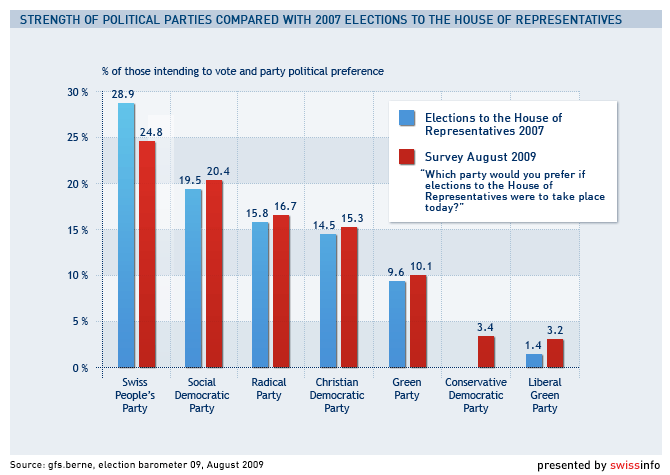

In compliance with the JTI standards
More: SWI swissinfo.ch certified by the Journalism Trust Initiative










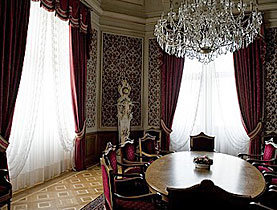
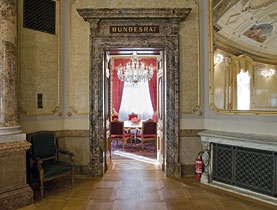
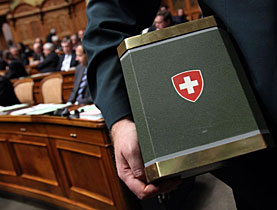

You can find an overview of ongoing debates with our journalists here . Please join us!
If you want to start a conversation about a topic raised in this article or want to report factual errors, email us at english@swissinfo.ch.